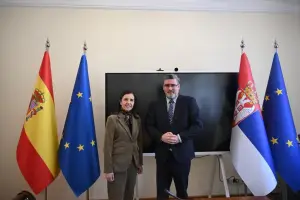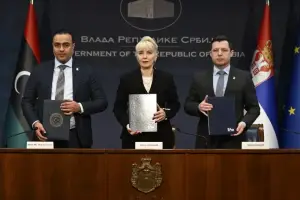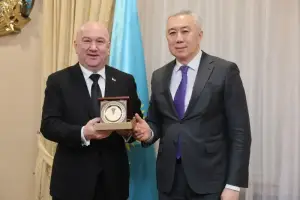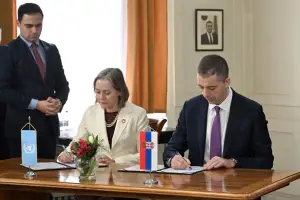Q:
A:
Serbian government fully committed to EU integration
Belgrade,
23 April 2004
Serbian Minister of International Economic Relations Predrag Bubalo said that the Serbian government is fully committed to the process of European integration, especially the EU integration, and that it is realised through a wide range of activities, from the adoption of legislation harmonised with the European Union to the adoption of technical standards which will enable competitive access of Serbian goods on the EU market.
Speaking at a monthly business lunch at the representative office of the US Chamber of Commerce in Serbia-Montenegro, held on April 21, Bubalo said that the main goal of the Serbian Ministry of International Economic Relations is to contribute to more efficient integration of the Serbian economy into the world market. To achieve that, it is necessary to attract foreign investment and increase Serbian exports, Bubalo specified.
The Minister explained that the direct foreign investment brings in new capital which would otherwise not be available, as well as new technology, modern management, better use of resources, higher exports and integration into the world economy. He added that it would be very difficult to increase competitiveness of domestic economy without foreign investment.
Bubalo expressed belief that Serbia has a lot to offer to foreign investors, including highly skilled labour force which is competitively priced, strong business attitude among Serbian managers, and a number of industrial sectors, such as IT and electronics, pharmaceuticals, agribusiness, textile, automobile parts and components, chemical and wood processing industries, which could be made competitive with relatively small investment.
Additional favourable conditions for direct foreign investment is Serbia's favourable geographical location, the system of free trade agreements which increases the size of the potential market manifold and the preferential trade agreement with the EU, said Bubalo.
The Minister of International Economic Relations said that the regional security, political stability and business environment are the main reasons for the lack of investment in Serbia, explaining that the image of Serbia as a country which belongs to a very unstable region is changing very slowly, in spite of the fact that in the last three years Serbia has made great strides in promoting and enhancing regional security and stability. The government and the Ministry are committed to increasing the level of internal political stability, since foreign investors must be convinced that Serbia is rapidly becoming a country that respects law, and that the legal and institutional systems are comparable to Western standards, said Bubalo. He added that the government's priorities are the adoption of a new constitution that would be the linchpin of stability and security in Serbia, as well as a sweeping judiciary reform which would guarantee that the laws are obeyed.
As far as the business environment is concerned, the objective of the government and the Ministry is to create an efficient and transparent economic environment that foreign direct investors will easily recognize as being similar to the one they currently operate in and which offers adequate opportunities for a good return on investment, Bubalo said.
According to Bubalo, some of the key elements of this environment are already in place, such as the law on concessions, law on leasing, securities market act, law on public procurement and the labour law. All of these laws have been favourably assessed by the international financial organisations and the foreign business community already present in Serbia.
Bubalo pointed out that more then 1,000 foreign companies and 15 multinational companies operate in Serbia at the moment, and that the inflow of more than 2.1 billion euros was generated through privatisation.
The common stance of the government and the Ministry is that Serbia can do much better, and therefore the business environment is being improved even further.
The priorities of the government and the Ministry are the adoption of a law on bankruptcy that will simplify the bankruptcy procedure, laws on energy and on railways that will create opportunities for large private sector investment, law on international commercial arbitration and the law on conflict of interest which will reduce corruption.
Bubalo also highlighted the importance of the law on enterprises which will simplify the start-up procedure, law on foreign trade transactions which will be in line with the World Trade Organisation and the EU provisions and requirements, the mortgage law, law on money laundering, law on rehabilitation, bankruptcy and liquidation of banks which will create a far more efficient banking sector, and the law on value added tax which should come into effect by January 1, 2005.
High on the government's and the Ministry's priority list is also further deregulation through simplification of registration procedure and the reform of inspections procedures, which are underway. The Ministry also plans to adopt an action plan for the removal of all unnecessary administrative barriers. The Serbian Investment and Export Promotion Agency should soon start to operate as an independent state body, responsible for assisting foreign investors in their search for business and investment opportunities in Serbia, Bubalo stressed.
He said that the Ministry is currently negotiating a textile trade agreement with the EU, and that it is working on the implementation of a national competitiveness strategy, mostly through development of successful export-oriented clusters in several sectors of industry and agriculture.
Bubalo concluded that the attracting of foreign investment, increasing of competitiveness and expanding of exports is a long-term process, but the Ministry is has the will and determination to speed up that process as much as possible.
The Minister explained that the direct foreign investment brings in new capital which would otherwise not be available, as well as new technology, modern management, better use of resources, higher exports and integration into the world economy. He added that it would be very difficult to increase competitiveness of domestic economy without foreign investment.
Bubalo expressed belief that Serbia has a lot to offer to foreign investors, including highly skilled labour force which is competitively priced, strong business attitude among Serbian managers, and a number of industrial sectors, such as IT and electronics, pharmaceuticals, agribusiness, textile, automobile parts and components, chemical and wood processing industries, which could be made competitive with relatively small investment.
Additional favourable conditions for direct foreign investment is Serbia's favourable geographical location, the system of free trade agreements which increases the size of the potential market manifold and the preferential trade agreement with the EU, said Bubalo.
The Minister of International Economic Relations said that the regional security, political stability and business environment are the main reasons for the lack of investment in Serbia, explaining that the image of Serbia as a country which belongs to a very unstable region is changing very slowly, in spite of the fact that in the last three years Serbia has made great strides in promoting and enhancing regional security and stability. The government and the Ministry are committed to increasing the level of internal political stability, since foreign investors must be convinced that Serbia is rapidly becoming a country that respects law, and that the legal and institutional systems are comparable to Western standards, said Bubalo. He added that the government's priorities are the adoption of a new constitution that would be the linchpin of stability and security in Serbia, as well as a sweeping judiciary reform which would guarantee that the laws are obeyed.
As far as the business environment is concerned, the objective of the government and the Ministry is to create an efficient and transparent economic environment that foreign direct investors will easily recognize as being similar to the one they currently operate in and which offers adequate opportunities for a good return on investment, Bubalo said.
According to Bubalo, some of the key elements of this environment are already in place, such as the law on concessions, law on leasing, securities market act, law on public procurement and the labour law. All of these laws have been favourably assessed by the international financial organisations and the foreign business community already present in Serbia.
Bubalo pointed out that more then 1,000 foreign companies and 15 multinational companies operate in Serbia at the moment, and that the inflow of more than 2.1 billion euros was generated through privatisation.
The common stance of the government and the Ministry is that Serbia can do much better, and therefore the business environment is being improved even further.
The priorities of the government and the Ministry are the adoption of a law on bankruptcy that will simplify the bankruptcy procedure, laws on energy and on railways that will create opportunities for large private sector investment, law on international commercial arbitration and the law on conflict of interest which will reduce corruption.
Bubalo also highlighted the importance of the law on enterprises which will simplify the start-up procedure, law on foreign trade transactions which will be in line with the World Trade Organisation and the EU provisions and requirements, the mortgage law, law on money laundering, law on rehabilitation, bankruptcy and liquidation of banks which will create a far more efficient banking sector, and the law on value added tax which should come into effect by January 1, 2005.
High on the government's and the Ministry's priority list is also further deregulation through simplification of registration procedure and the reform of inspections procedures, which are underway. The Ministry also plans to adopt an action plan for the removal of all unnecessary administrative barriers. The Serbian Investment and Export Promotion Agency should soon start to operate as an independent state body, responsible for assisting foreign investors in their search for business and investment opportunities in Serbia, Bubalo stressed.
He said that the Ministry is currently negotiating a textile trade agreement with the EU, and that it is working on the implementation of a national competitiveness strategy, mostly through development of successful export-oriented clusters in several sectors of industry and agriculture.
Bubalo concluded that the attracting of foreign investment, increasing of competitiveness and expanding of exports is a long-term process, but the Ministry is has the will and determination to speed up that process as much as possible.











